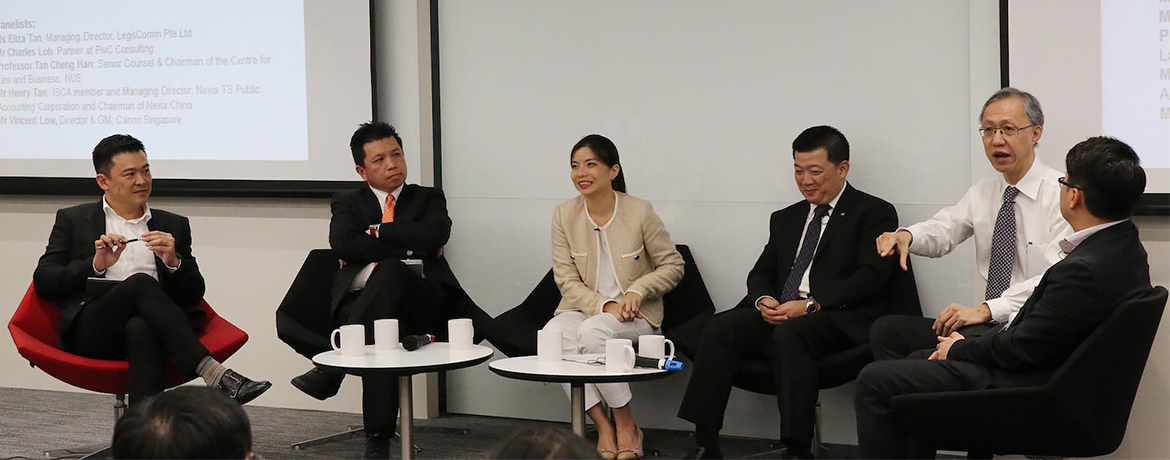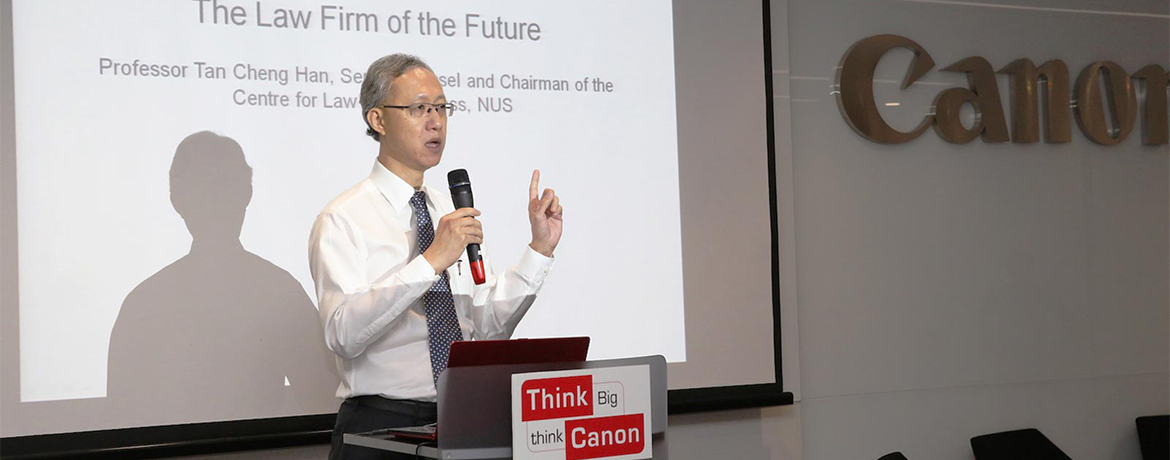Ahead of the Game: Disruptive Innovation and What You Can Do About It Right Now - Business Insight

Ahead of the Game: Disruptive Innovation and What You Can Do About It Right Now
A literal disruption is the last thing anybody wants when it comes to business operations. Anytime established processes are forced to halt or go through radical overhauls, we become resistant to the idea — and understandably so.
However, in today’s day and age, disruption does not necessarily have to be a scary word. Looking at it from another perspective, they can be seen as opportunities.
Canon Singapore shares that viewpoint, which is why the topic of disruptions, or disruptive innovations, was the focus of the recent Think Big Leadership event held on 26 May at Canon Singapore’s new office at One-North. The event explored the ways in which disruptive innovations have become the new norm in various markets, as well as how legal and accounting firms in particular can face the novel challenges head on while upholding the highest professional integrity. With an impressive panel of experts in attendance, it was a fruitful afternoon for all.
Change is the Only Constant
Eliza Tan, founder and managing director of marketing firm LegisComm, kicked off the event with a reality check: change is coming, whether we like it or not. Tan used Uber and Airbnb as examples of disruptive innovations that truly made a mark in recent years. By utilising technology, Uber and Airbnb have, within a relatively short period of time, gained significant footholds in the transportation and hospitality industries, respectively — the very definition of disruptive innovation.
Legal and accounting firms are not immune to the trend either. Tan brought up the example of LegalZoom, a US-based provider of personalised, online legal solutions and legal documents for small businesses. Even though the company has yet to reach Singapore shores, Tan believes that it is pertinent to keep up with the times and prepare for the inevitable digital disruption.
Aside from harnessing the power of social media, Tan proposes that firms need to differentiate and diversify their services at a much lower cost. There also needs to be an improvement in quality and speed of professional advice via quicker access to research, technology and collaboration.
The Bottom Line
Charles Loh, a partner at PwC Consulting (Singapore), brought an impressive array of statistics to show that, by embracing various technologies, operations at PwC have quantitatively improved over the years. “More than 74,000 hours of productivity has been saved for our client-facing staff, most of which was achieved via technology,” said Charles. “On top of that, more than 8,500 hours of productivity was saved for our practice support staff.”
PwC achieved these numbers from several fronts. For example, in terms of client management, PwC utilised data analytics, customer relationship management software and tax applications to streamline processes and increase efficiency. Processes, too, received automation makeovers in the Finance and Human Resource departments. Within the office, knowledge management and IT systems were also put in place for more efficient sharing and collaborations. These benefits did add up over time, allowing PwC to stay ahead of the game.

The Law Firm of the Future
Prof Tan Cheng Han, the senior counsel and chairman of the Centre for Law and Business, National University of Singapore, then gave an impassioned talk on how, in view of the digitalisation of professional services, law firms of the future need to be tighter and more collaborative than ever before.
One way to do so, according to Prof Tan, is through technology. For example, instead of outsourcing or hiring interns to do grunt work, certain processes can be automated or digitised, thus lowering cost and improving efficiency. Digitised documents also mean less need for physical storage space, thus saving on rent — a heavy financial burden on law firms. “Technology is the great leveller, so use these services and see how they work,” Prof Tan advised. “The solution may not always be easy or palatable, but that is the way of the future.”
The Experts Weigh In
The event was capped off with a five-member panel discussion, with law firm Rajah & Tann’s managing partner Lee Eng Beng at the helm. Henry Tan, managing director of accounting firm Nexia TS, and Vincent Low, director and general manager of Canon Singapore, also joined the three previous speakers on stage to share ideas.
Prof Tan emphasised the points he made earlier about creating a leaner, more nimble law firm. “For law firms of the future, one way to lower cost is to reduce their office footprint. I think it is unnecessary for law firms to have such a big office space these days. Another way is to leverage technology. The turnaround time for documentation can be quicker and certainly more efficient. That will also reduce the need for headcount in the law firm as well,” said Prof Tan.
The day’s discussions eventually came back around to Canon. After all, between talks about law and accounting firms adapting for the future, where does Canon Singapore fit in?
According to Low, Canon’s strength lies in the company’s solutions and its people. “We are one of very few solution providers that owns a suite of business solutions,” Low said. “This provides Canon with a lot of flexibility when it comes to innovation. Also, we are the trusted partner of many organisations because of our key asset: people. Our business solutions are supported by a group of people who are rich in experiences in their respective areas of expertise. We pride ourselves very much in that.”
For the latest in Canon Singapore’s news, views and content picks, follow Canon Singapore on LinkedIn.
